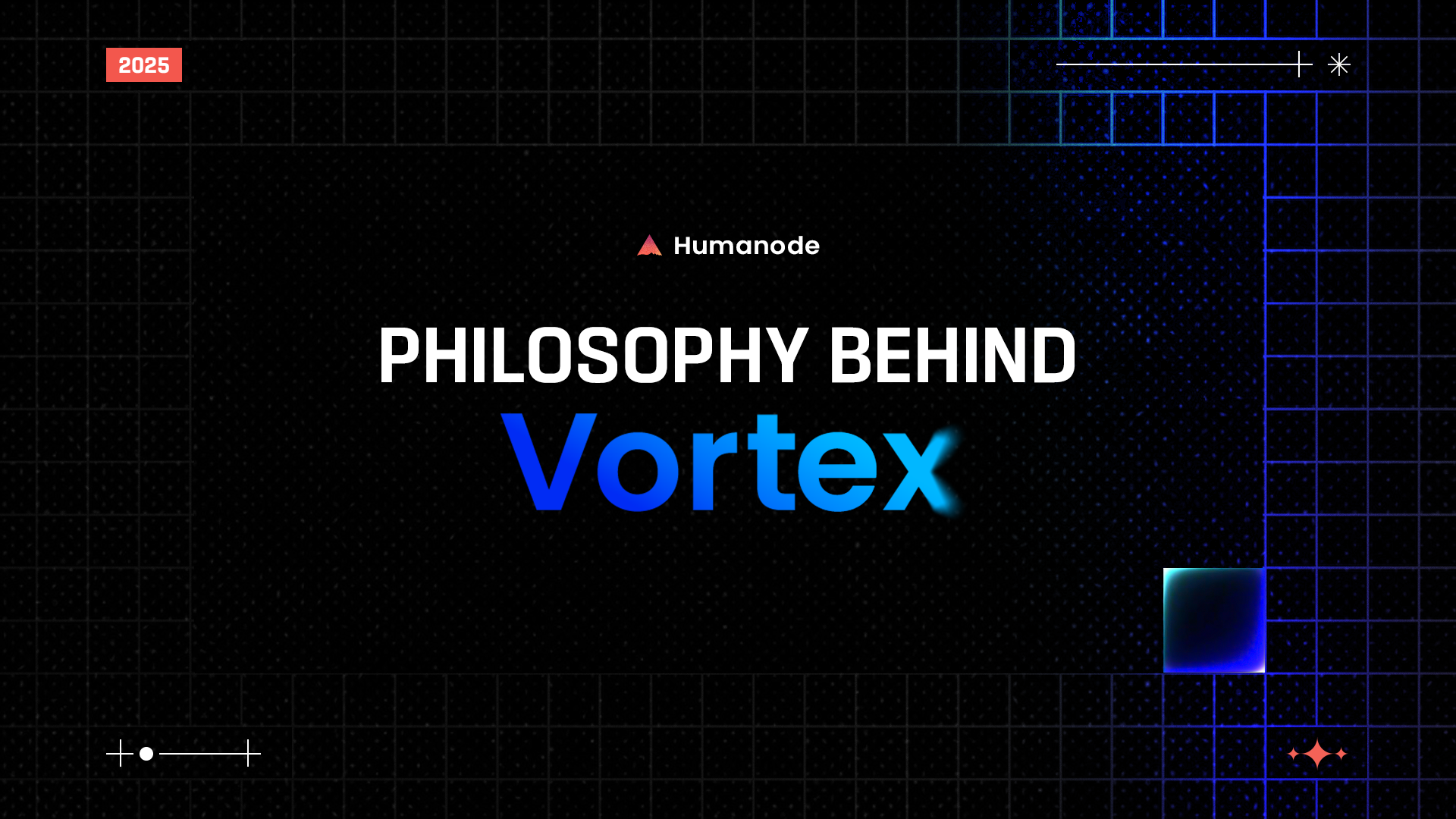The Philosophy Behind Vortex

By now, many understand that Vortex refers to the Humanode DAO. If we were to get technical, the DAO is only one part of the Vortex in its entirety, but let's set that aside for now.
We have talked about the governance tiers, and we have talked about who is eligible to participate in Vortex, and how the answer to that is any validator who has an interest in putting their vision, time, and effort into assisting the growth of Humanode. You also learned that money cannot buy voting power in a one-human, one-node, one-vote system.
With all of that said, today we would like to talk about the philosophy that supports Vortex and how it will shape the governance in Humanode.
The foundation of Vortex is cognitocracy, with the underlying philosophy supporting cognitocracy being technocracy, meritocracy, Intellectual qualifications for obtaining voting rights, a hybrid of direct and representative democracies, and liquid democracy
Yes, a lot of big words there. We will break them down in a bit.
But first, what is cognitocracy?
The word cognitocracy is derived from "cognition" and "-cracy" (meaning rule). It refers to a system of governance where political power is held by individuals deemed to possess superior cognitive abilities or knowledge. Some say that it is an elitist approach to democracy, but we have a few things to say about that.
In the modern world, the “elites” often refer to those with money and power. Being an elite rarely has to do with actual knowledge or individual effort. If you are born into money and power, people will call you an “elite”. If you go to a top school and study, making advances in whatever field you specialize in, you are also an “elite”. But then again, the rich snob who got placed into that school because their family donated an amount that could feed a small country for a while, is also labeled as an “elite”, no matter how clueless and deranged he is.
And as you know by now, money does not equal power, at least in Humanode.
We want to give people an equal voice and equal vote. At the same time, we need leaders, each specializing in their own field, to advance Humanode and its community further, make wise day-to-day decisions, and make meaningful suggestions to the community.
In simple terms, although we all vote on if we want chocolate cake or not, once we decide to have it, we want people who know how to prepare the best chocolate cakes to bake the chocolate cakes… not people who mistake chocolate for Vegemite, or worse, brown colored plaster that just looks like chocolate.
The closest approach we could find was Cognitocracy, although we may add new meaning to the word as we move forward.
In the Vortex whitepaper, it is made clear that there are several primary objectives of cognitocracy.
- First, it is to form an elitogenesis sequence where the elite of the society is formed through demonstrating creative brilliance that evolves into real-world benefits.
- Second, to create a just competitive ecosystem for specialists that would constantly drive creativity and innovation to higher levels.
- Third, to make sure that there is a separation of power based on proof of knowledge and specialization, rather than a popularity contest.
- Fourth, to foster a cooperative environment that drives optimization and creativity to its highest potential.
- Fifth, to create an evolving intellectual barrier for obtaining voting rights and legislative mandate. “
Ok, let us break things down.
Technocracy
As in anything in life, but maybe more so in blockchain, the advancement of technology holds the key. Technocracy implies that the decision-makers are selected based on their technological knowledge and technology-oriented methods of solving issues.
The key to Technocracy in the Humanode context is that it is part of Cognitocracy, and inherits the principles of technological innovation and the concentration of power in the hands of those who strive for innovation and technological development. However, it puts aside the plutocratic trait of a common technocracy, where those in power gather all the technology in their hands and prevent others from innovating. Technology for the sake of technology, and advancement for the sake of advancement, is the mentality of a cancer cell.
We need advancement as a tool to solve real-world problems and give real-world benefits that benefit everyone, not just those who “own” the technology.
Meritocracy
Throughout the history of mankind, although never truly achieved, it has been claimed, over and over, that merit must be the decisive factor in determining who is fit to rule.
Unfortunately, as stated in the Vortex Whitepaper, favoritism, nepotism, blood-based capital inheritance, and some other factors have been obstructing meritocracy from being enacted for a prolonged period.
The problem for us is that cognitocracy cannot function without meritocracy.
The thing to remember here is that cognitocracy derives from the very principle of merit, but with a strong inclination towards creativity and innovation rather than functionality and working experience. Meaning, in the context of cognitocracy, merit is a decisive factor, but as it also relates to other elements, such as its technocratic traits, the key would be to establish an equilibrium between the various essences that are the foundation of the Humanode philosophy.
Intellectual qualifications for obtaining voting rights
The obvious question that sticks out is “How the hell do you prove that you have the intellectual qualifications?”.
When talking about Vortex, envision legislative governance. Imagine we have the option to propose a change in the fee distribution system.
One person says, “The validators should get more money for being loyal to Humanode! I propose that each person gets 100,000 HMND for their loyalty!”
If we only had a small pool of voters, and the voters do not have the intellectual qualifications, we may end up having to pay out 100,000 HMND to everyone, killing the system in one fell swoop.
If you want to see real-life cases of the horror of having legislative voters without Intellectual qualifications, and see what havoc they can wreak, just look at Nazi Germany, or perhaps even the current America.
In the context of Humanode and cognitocracy, we put up the intellectual barrier in the form of proposals. Unless you have made proposals that get accepted, you are not able to go beyond the most basic tier as a governor in Vortex. By being able to write, support the logic and reasoning of your proposal, and have people see the brilliance in it, thus passing the proposal, you cannot pass the barrier needed to govern.
Do not be too afraid, though, as we move forward, Vortex will be split into various chambers. A governor focused on technological advancement may not be a governor in, say, the Chamber of Media. A governor focused on making cool videos may not have the knowledge required to serve in the Chamber of Accounting.
The key here is that we need the write people, in the right place.
A hybrid of direct and representative democracies
Cognitocracy aims to maximize the direct participation of eligible voters in the governing process while acknowledging the delegation of vote as a necessary instrument to express political will without constant participation.
One of the downfalls of many DAOs, and government voting systems for that matter, is voter apathy. Another is just being too busy to deal with the number of proposals in order to do a good job. And then there is the case of not having the specialties concerning a specific topic, for the voter to feel that their vote means anything.
In the case of DAOs, without having the required participation to form a quorum, votes will fail. If people don’t show up, DAOs fail.
Thus, one of the keys is to give the ability to entrust your vote to someone else. In real-world governments, that “someone” is usually a political party or a governor. We entrust our voice, and pray that our interests will be represented properly. But as we all know, this system tends to fall apart rather quickly, without fail. We will not go into it deeply here, but it all comes down to vested interests and enjoying the poisons and benefits of the concentration of power for prolonged periods of time.
Thus, in order to make this system work, we come to the fifth and final point.
Liquid Democracy
In the case of cognitocracy, liquid democracy is applied to voice delegation, as there are no elections. Cognitocrats can only delegate their power to other cognitocrats.
If a voter feels that they do not have the specialty concerning a topic, they need to be able to entrust their voice to a person who they believe will represent their voice the most.
But even more importantly, if you do not like how you are being represented, find a better voice, or even want to just go ahead and vote yourself, you need the ability to take your voice back, or change your “voice”, whenever you want, and without constraints.
You should also be able to set different voices for different topics. i.e., I trust my wife when it comes to choosing the materials to buy for dinner, but I trust my daughter for the dessert selection, and my son for the selection of tea.
The ability to change delegation at any time allows voters to respond dynamically to changing circumstances or evolving opinions. This adaptability ensures that representation remains aligned with the cognitocrats' current preferences.
In conclusion, it is easy to get lost in specific big words. But it is important to remember that words are living and evolving beings. Depending on who uses a specific word how, the meaning may differ. Thus, we hope that when you hear about Vortex or Cognitocracy in the future, you will remember the philosophy and the meanings that have been placed in them from their inception.
As Vortex, as an application and as the foundation for the Humanode DAO, is currently being built, we will be planning further articles on the topic, with the next Vortex Article scheduled to be about the various Chambers.

